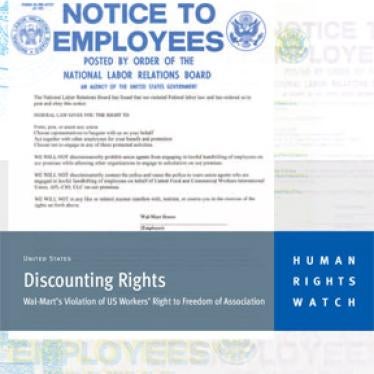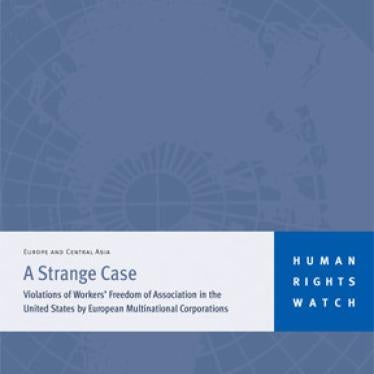(Washington, DC) - Proposals in Wisconsin, Ohio, Indiana, and other states to strip public workers of collective bargaining rights violate international labor rights standards, Human Rights Watch said today.
"There are real financial constraints on states, but that is no excuse to seek to eliminate fundamental rights," said Alison Parker, US Program director at Human Rights Watch. "State governments can negotiate cost savings with workers without violating their rights in the process."
International law on the right to bargain collectively applies in both private and public workplaces. The United States championed the International Labor Organization's 1998 Declaration on Fundamental Principles and Rights at Work, under which the US pledged "to promote and to realize ... fundamental rights" defined in the declaration, the first of which is "freedom of association and the effective recognition of the right to collective bargaining."
The United States is also a party to and bound by its obligations under the International Covenant on Civil and Political Rights, which guarantees everyone the right to protect his or her interests through trade union activity. As the Human Rights Committee has made clear on multiple occasions, that includes collective bargaining. Denying the right to collective bargaining would violate this international treaty, Human Rights Watch said.
Most major advanced democratic countries honor collective bargaining rights of public employees. For example, all EU countries allow public sector workers to bargain collectively. In a 2008 case, the European Court of Human Rights found that Turkey's restrictions on public employee bargaining rights violated the European Convention on Human Rights. In 2007 the Supreme Court of Canada ordered the province of British Columbia to restore collective bargaining agreements nullified by legislation.
By contrast, many undemocratic countries restrict or prohibit collective bargaining by public employees. For example, the Egyptian government has prohibited public sector collective bargaining. It allowed public employee unions to exist, but in name only, favoring government-controlled unions and quashing any attempt to bargain collectively.
Under federal law in the United States, public employees' right to organize is respected, compliant with international standards. However, federal law severely restricts subjects of bargaining in ways that run afoul of international standards - federal employees cannot bargain over economic issues such as pay and benefits, for example.
At the US state level, many states respect the right to organize and bargain collectively and allow wide scope for subjects of bargaining, consistent with international standards. Other states, like North Carolina, prohibit collective bargaining altogether, in violation of international human rights norms.
Wisconsin historically has been called a "laboratory of democracy" in the American system with a strong record of honoring workers' rights of association, organizing, and bargaining. It was one of the first states to grant public employees the right to bargain collectively, but is now on the verge of violating those basic rights, Human Rights Watch said.
Having the right to bargain collectively does not guarantee outcomes sought by workers and their unions. Nor does it mean that cost savings cannot be achieved. Rather workers' representatives and representatives of employers, whether public or private, have a right to bargain hard for their interests. The reason why collective bargaining is recognized as an international human right is that the compromises resulting from a process in which workers have an autonomous voice reflect principles of dignity, equality, and democracy consistent with human rights principles.
"Wisconsin, Ohio, Indiana, and other states threatening to impose harsh new restrictions on public employees' collective bargaining rights should step back from the brink," Parker said. "They should honor public employees' right to bargain collectively."








